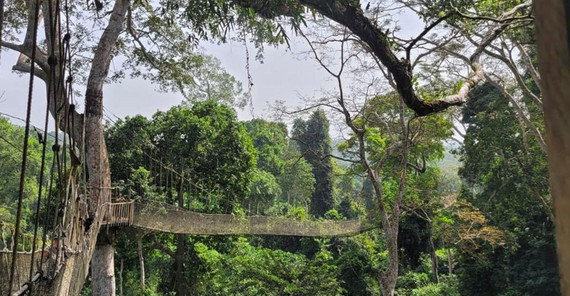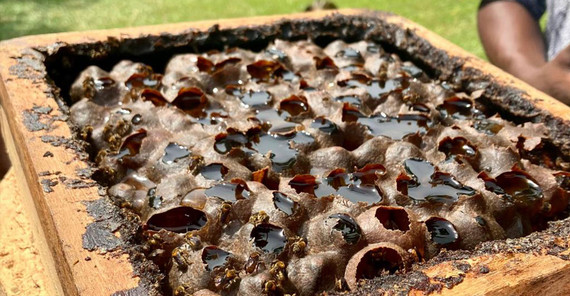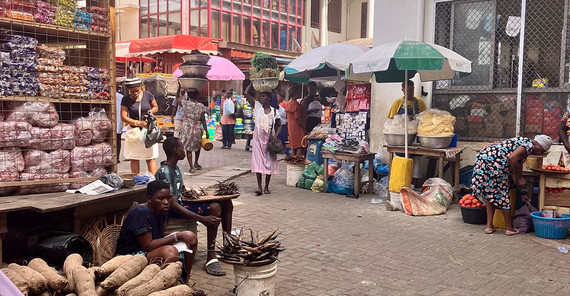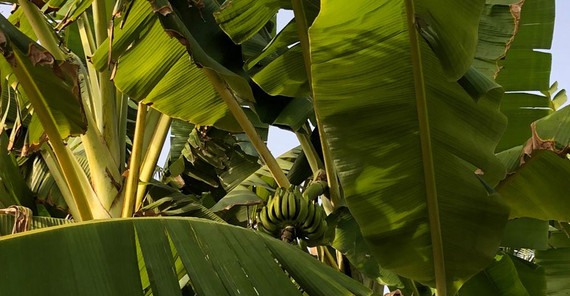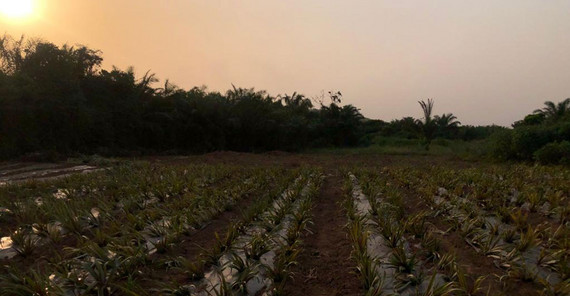Day 8: Kakum National Park and Stingless Bee Farm
After spending the day before on our research project, we set off early today - to Kakum National Park, a green oasis that we reach after a half-hour bus ride. Once there, we opt for the canopy walk and a short guided hike through the rainforest. The canopy walk takes us over seven suspension bridges that are between 10 and 40 meters above the ground. Our legs are shaking, but the view of the dense, green Jungle is breathtaking. During the guided hike, we get to know various native trees and learn about the enormous benefits they bring to humans. Many tree species still provide medicinal uses for the local population. We are impressed by the sounds of the rainforest. We hear different species of birds and cicadas, the wind blowing through the leaves and crackling in the undergrowth sometimes. The dense and varied greenery, in which we discover trees, lianas and a few creepy-crawlies that were unknown to us. It is a completely new experience.
Afterwards visit a Stingless Bee Farm. A friendly staff member gives us an informative introduction to the four bee species that live on the farm. We learn a lot about their respective characteristics and how to recognize and distinguish the species. We also learn that the products of the bee farm are also used in medicine. The farm sends its products to a hospital to the city of Kumasi, for example. After the introduction, we marvel at a beehive that is opened especially for us and taste honey straight from the comb. We return to our accommodation in the late afternoon, exhausted from the heat of the day.
Day 9: Visit the market in Cape Coast and wild hike to a pineapple farm
On the ninth day, we decide to drive to Cape Coast and visit a large market. The streets leading to our destination are already packed with cars and pedestrians. Various goods such as fruit, vegetables, fish, clothing, jewelry, hygiene products and household goods are on sale at the market. The smell and the narrow, crowded streets are overwhelming for us. The people react very differently to our presence. Some greet us happily and invite us to look at their goods. Others, however, look at us skeptically and dismissively and we are asked what we are doing at the market. We don't feel welcomed. We make our way back to our accommodation with mixed feelings and talk about what we have experienced.
After a short lunch break at the hotel, we happily start our afternoon program: visit a pineapple farm in Ankwanda. We start the half-hour tour across the village and head further into the countryside. We quickly reach narrow, winding and overgrown paths with waist-high grasses, palm trees and various plants. Our tour guide shows us how various fruits are grown and used. We see a native banana tree, a cashew tree, orange trees and a bright red, furry fruit that used to be a toothbrush. After walking fastly through the jungle for half an hour we reach the first pineapple fields. The guide explains that there are different types of cultivation and in which ways they differ. The tour takes us deeper and deeper into nature and reveals wonderful views over the countryside at sunset. Unfortunately, we get lost and the path through the thorny undergrowth and across the pointed pineapple leaves becomes increasingly wild and strenuous. After 2.5 hours and a few more scratches, we hit the road exhausted and looking forward to a shower and dinner. We had to learn the hard way that the clocks run differently in Ghana. In response to our displeasure, our guide says with a broad smile on his face: "That's Ghanaian time!"
To the travel diaries published so far (in German): https://www.uni-potsdam.de/de/up-entdecken/upaktuell/up-unterwegs-reisetagebuecher

